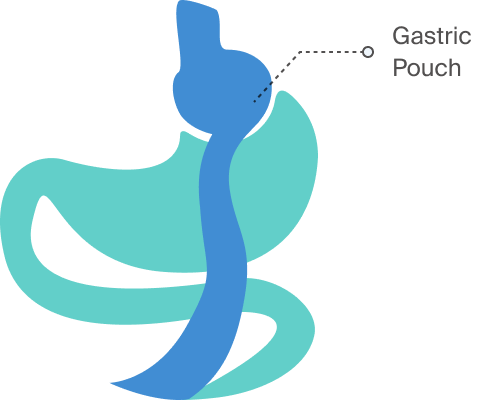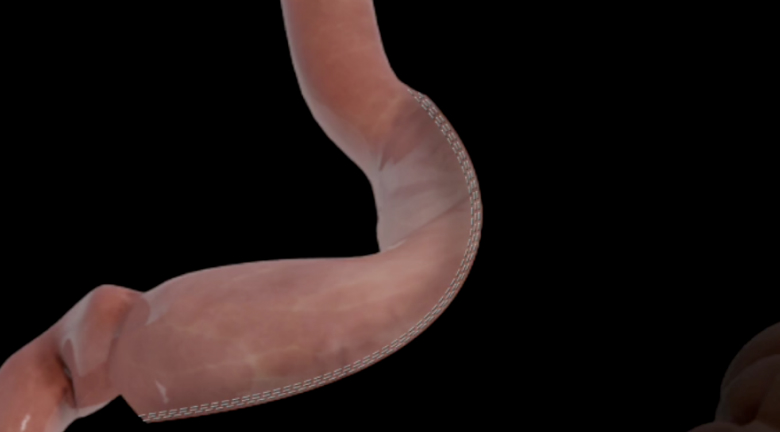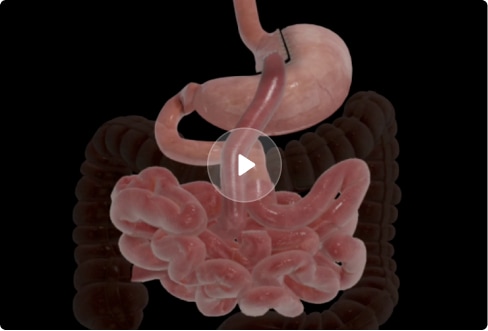Gastric Bypass
The gastric bypass helps you lose weight by creating a smaller stomach pouch and rerouting the path that food normally takes so you feel full faster, absorb fewer calories and have less overall hunger.

Before
Gastric Bypass

After

Losing Weight With Gastric Bypass
The gastric bypass works by creating a small stomach pouch and rerouting the path that food normally takes so that it “bypasses” a large section of the stomach and a portion of the small intestine.
The result is an early sense of fullness that reduces the desire to eat. Not only do patients who’ve undergone gastric bypass surgery lose weight because they cannot eat as much, they also absorb fewer calories. This dual approach - restrictive (restricts the amount of food) and malabsorptive (reduces the amount of calories absorbed) - jump starts weight loss. In addition, the gastric bypass also causes the secretions of fewer hunger hormones - grehlins - resulting in less overall hunger further contributing to weight loss. New Jersey Bariatric Center® patients who undergo gastric bypass surgery typically lose between 60-80% of their excess body weight.
The result is an early sense of fullness that reduces the desire to eat. Not only do patients who’ve undergone gastric bypass surgery lose weight because they cannot eat as much, they also absorb fewer calories. This dual approach - restrictive (restricts the amount of food) and malabsorptive (reduces the amount of calories absorbed) - jump starts weight loss. In addition, the gastric bypass also causes the secretions of fewer hunger hormones - grehlins - resulting in less overall hunger further contributing to weight loss. New Jersey Bariatric Center® patients who undergo gastric bypass surgery typically lose between 60-80% of their excess body weight.
How Much Weight Can I Lose With Gastric Bypass?
Your Potential Weight Loss with Gastric Bypass
- lbs.*
*On average, patients lose between 60-80% of their excess body weight as early as 12 months after gastric bypass surgery.
*As with all weight loss results vary based on several factors, including compliance with post-operative plan and behavior guidelines.
*Bariatric Surgery Procedures. (n.d.). In American Society for Metabolic and Bariatric Surgery. Retrieved December 3, 2020 from https://asmbs.org/patients/bariatric-surgery-procedures#learnmore
*Bariatric Surgery Procedures. (n.d.). In American Society for Metabolic and Bariatric Surgery. Retrieved December 3, 2020 from https://asmbs.org/patients/bariatric-surgery-procedures#learnmore
Health Improvements and Benefits
Health Benefits
The gastric bypass procedure results in sustained, long-term weight loss and improves, and in some cases resolves, obesity-related illnesses such as:
77%
Type 2 Diabetes
77% of patients have resolution2
62%
Hypertension
62% of patients have resolution2
84%
Sleep Apnea
84% of patients have resolution2
With type 2 diabetes, many patients stop taking their diabetic or high blood pressure medication before they leave the hospital and before weight loss. Also, with sleep apnea, there is improvement, or complete resolution, as weight loss results in the opening of air passages.
Side Effects & Risks
As with any surgery, there are side effects and risks to consider with weight loss procedures. When deciding whether gastric bypass surgery is right for you, the potential health benefits must also outweigh the potential risks. To learn more about specific complications associated with gastric bypass, visit our Side Effects & Risks page.
Learn MoreDo I Qualify for Gastric Bypass Surgery?
To qualify for gastric bypass surgery, a body mass index (BMI) of 40 or greater, or a BMI of 35 with obesity-related conditions such as diabetes, high blood pressure or sleep apnea should exist.
Calculate Your BMI

Gastric Bypass Procedure
The New Jersey Bariatric Center® surgeons perform the gastric bypass procedure laparoscopically through approximately four or five incisions in the abdomen. The surgeons staple off a section of the stomach, leaving the rest of the stomach in place and creating a pouch that can hold about a quarter-cup of food. The top part of the small intestine is then divided, and the bottom half of the divided small intestine is connected to the new, small pouch. Food then bypasses the stapled-off section of the stomach and 25% of the upper portion of the small intestine. The procedure lasts approximately 2-3 hours.
Request an AppointmentRecovery & Follow Up
On average, New Jersey Bariatric Center® patients leave the hospital within 1-2 days after gastric bypass surgery. When planning for the period after a gastric bypass surgery you will have the support of our dedicated team of medical professionals who will work
with you on nutrition, exercise, and psychological needs both before surgery and for the long-term.
Learn MoreGastric Bypass Patient Stories
Willie Lost 200lbs with Gastric Bypass Surgery*
La-Fina Lost 221 lbs with Gastric Bypass*
Marissa Lost 90 lbs with Gastric Bypass*
Gastric Bypass FAQs
To qualify for gastric bypass surgery you must have a body mass index (BMI) of 40 or greater or a BMI of 35 or greater with one or multiple obesity-related health problems such as type 2 diabetes, sleep apnea and high blood pressure. Once you qualify, one of our fellowship-trained surgeons can help you determine if gastric bypass surgery is right for you.
Weight loss surgery is just the first step in a lifelong commitment toward better health. When deciding which procedure is right for you, it is important to keep in mind that surgery is only a tool. Your ultimate success depends on your adherence to the recommended dietary, exercise and lifestyle changes. Not all weight loss surgery procedures are the same. If you qualify, our team will guide you in deciding which procedure will give you the best chance for success based on factors such as your current weight and your ability to follow the post-surgical guidelines. For more info on each procedure, click here.
It’s important to know that weight loss surgery is a tool to jumpstart weight loss. Long term success after gastric bypass or any other weight loss surgery is achieved through lifestyle changes, maintaining a healthy diet and exercise to avoid weight regain.
Many weight loss surgery patients are surprised to learn that hair loss is a common side effect of bariatric surgery and it doesn’t matter if you’ve had Gastric Bypass or Gastric Sleeve. The truth is many patients will experience some degree of hair-thinning, especially between the third and sixth month after surgery. The good news is that there are several treatment options for this problem. And the better news is that since the hair follicles are not damaged, the hair will grow back. Read more here.
If you are a woman of child-bearing age, it is strongly advised that you wait at least a year before trying to conceive because bariatric surgery patients lose weight quickly during the first year, and it may be difficult to support the nutrition of both mom and baby during this period of rapid weight loss. By delaying a pregnancy, you are better assured that you will be able to get the proper nutrition for the health of your baby and yourself. The weight you are able to lose after surgery can significantly reduce the risks of gestational diabetes, preeclampsia, pre-term labor, postpartum bleeding, infant mortality and other pregnancy-related complications. It has been published that a woman can reduce these risks by losing as little as 5% of her weight. Losing more than that with bariatric surgery – gastric bypass or gastric sleeve – could make pregnancy even safer. Consult your gynecologist to help you plan for pregnancy.
Patient Journey
Interested in gastric bypass surgery? Visit our patient journey page to learn about the next steps.
Patient JourneySources:
1. Bariatric Surgery Procedures. (n.d.). In American Society for Metabolic and Bariatric Surgery. Retrieved December 3, 2020, from https://asmbs.org/patients/bariatric-surgery-procedures#learnmore
2. Metabolic and bariatric surgery. (2018, October). In American Society for Metabolic and Bariatric Surgery. Retrieved November 10, 2020, from https://asmbs.org/resources/metabolic-and-bariatric-surgery
1. Bariatric Surgery Procedures. (n.d.). In American Society for Metabolic and Bariatric Surgery. Retrieved December 3, 2020, from https://asmbs.org/patients/bariatric-surgery-procedures#learnmore
2. Metabolic and bariatric surgery. (2018, October). In American Society for Metabolic and Bariatric Surgery. Retrieved November 10, 2020, from https://asmbs.org/resources/metabolic-and-bariatric-surgery








